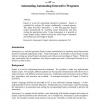Free Online Productivity Tools
i2Speak
i2Symbol
i2OCR
iTex2Img
iWeb2Print
iWeb2Shot
i2Type
iPdf2Split
iPdf2Merge
i2Bopomofo
i2Arabic
i2Style
i2Image
i2PDF
iLatex2Rtf
Sci2ools
LISA
1996
1996
How to Avoid Learning Expect -or- Automating Automating Interactive Programs
: Expect is a tool for automating interactive programs. Expect is controlled by writing Tcl scripts, traditionally a manual process. This paper describes Autoexpect
Related Content
| Added | 02 Nov 2010 |
| Updated | 02 Nov 2010 |
| Type | Conference |
| Year | 1996 |
| Where | LISA |
| Authors | Don Libes |
Comments (0)

